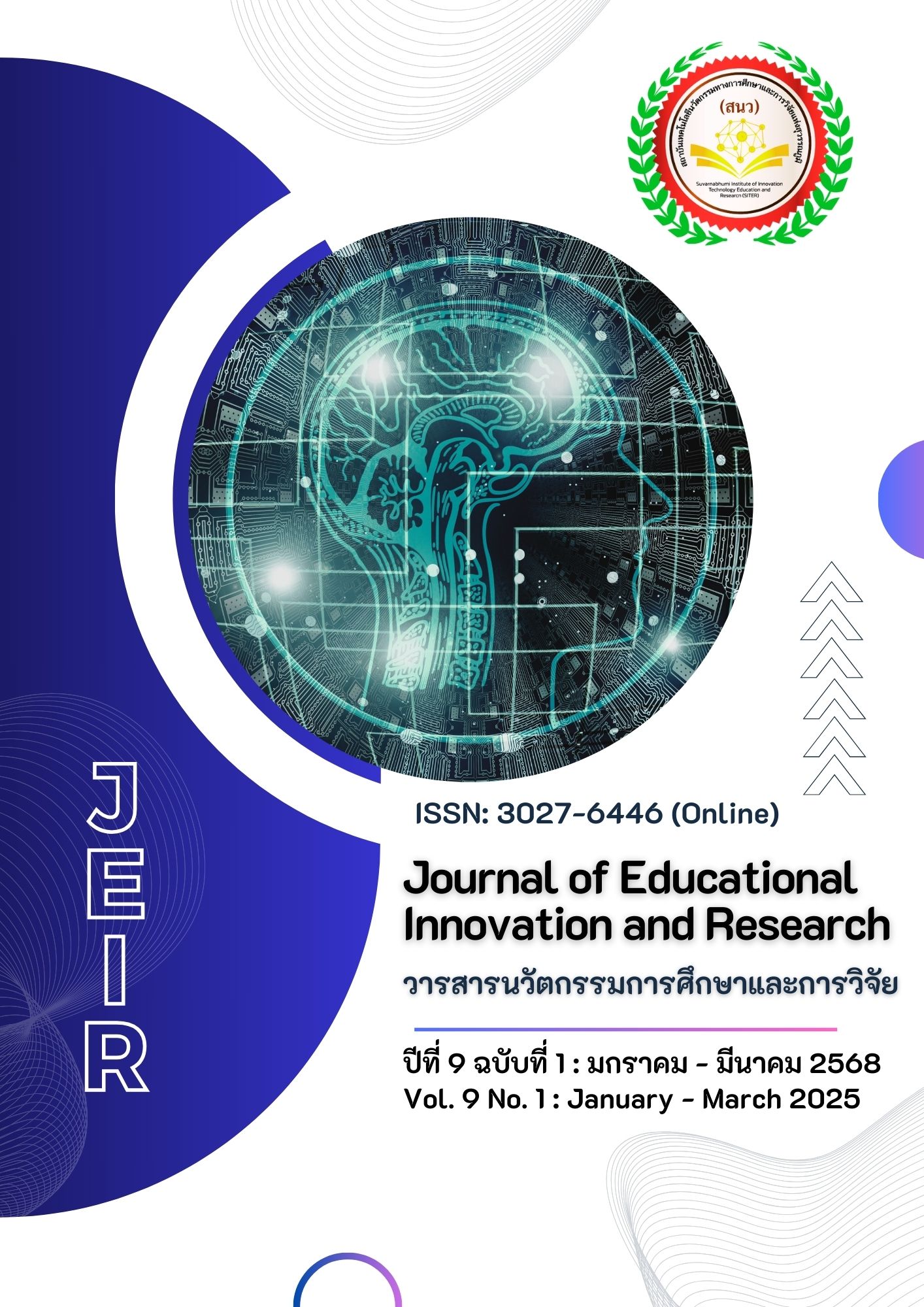ความต้องการจำเป็นในการนิเทศการสอนเพื่อส่งเสริมการจัดการเรียน การสอน Unplugged Coding ระดับประถมศึกษาตอนต้นของโรงเรียนในสังกัดสำนักงานเขตพื้นที่การศึกษาประถมศึกษาสมุทรปราการ เขต 2
Main Article Content
บทคัดย่อ
การวิจัยนี้มีวัตถุประสงค์เพื่อศึกษาความต้องการจำเป็นในการนิเทศการจัดการเรียนการสอน Unplugged Coding ระดับประถมศึกษาตอนต้นของโรงเรียนในสังกัดสำนักงานเขตพื้นที่การศึกษาประถมศึกษาสมุทรปราการเขต 2 รูปแบบการวิจัยเป็นการวิจัยเชิงปริมาณ โดยใช้แนวคิดการจัดการเรียนการสอนเป็นกรอบในการวิจัย ซึ่งประกอบด้วย 1) การแปลงหลักสูตรไปสู่การสอน 2) การจัดการเรียนการสอน 3) การใช้สื่อและพัฒนาสื่อการเรียนการสอน และ 4) การวัดและประเมินผลการเรียนการสอน ประชากรที่ใช้ในการวิจัยโดยการสุ่มแบบเจาะจง คือ โรงเรียนประถมศึกษาในสังกัดสำนักงานเขตพื้นที่การศึกษาประถมศึกษาสมุทรปราการเขต 2 จำนวน 71 แห่ง ผู้ให้ข้อมูลจากแต่ละโรงเรียนประกอบด้วยหัวหน้ากลุ่มสาระการเรียนรู้วิทยาศาสตร์และเทคโนโลยี จำนวน 1 คน และครูวิชาวิทยาการคำนวณระดับประถมศึกษาตอนต้น จำนวน 3 คน รวมผู้ให้ข้อมูลทั้งสิ้น จำนวน 284 คน ผู้ทรงคุณวุฒิตรวจประเมินประสิทธิภาพด้านเนื้อหาโดยมีค่าดัชนีความสอดคล้อง (IOC) อยู่ที่ 0.67-1.00 เครื่องมือที่ใช้ในการวิจัย ได้แก่ แบบสอบถามแนวทางการนิเทศการสอนเพื่อส่งเสริมการจัดการเรียนการสอน Unplugged Coding ระดับประถมศึกษาตอนต้นของโรงเรียนในสังกัดสำนักงานเขตพื้นที่การศึกษาประถมศึกษาสมุทรปราการ เขต 2 วิเคราะห์ข้อมูลด้วยการหาค่า ค่าเฉลี่ย ส่วนเบี่ยงเบนมาตรฐาน และค่าดัชนีความต้องการจำเป็น ผลการวิจัย พบว่า การนิเทศการสอนด้านที่มีความต้องการจำเป็นที่สุด คือ ด้านการแปลงหลักสูตรไปสู่การสอน มีค่า PNImodified เท่ากับ 0.229 รองลงมา คือ ด้านการวัดและประเมินผลการเรียนการสอนและด้านการจัดกิจกรรมการเรียนการสอน มีค่า PNImodified เท่ากับ 0.203 และ 0.199 ตามลำดับ
Article Details

อนุญาตภายใต้เงื่อนไข Creative Commons Attribution-NonCommercial-NoDerivatives 4.0 International License.
เอกสารอ้างอิง
Art-in, S. (2018). Curriculum Development. (4th ed.). Khon Kaen University.
Bell, T., Alexander, J., Freeman, I., & Grimley, M. (2009). Computer Science Unplugged: school students doing real computingwithout computers. New Zealand Journal of Applied Computing and Information Technology, 13(1), 20-29.
Chantapha, S. (2019). Coding For ALL. The Institute for the Promotion of Teaching Science and Technology Magazine, 47(219), 1-6.
Relkin, E., de Ruiter, L.E. & Bers, M.U. (2021). Learning to code and the acquisition of computational thinking by young children. Tufts University, USA http://doi.org/10.1016/j.compedu.2021.104222
Huang & Looi (2021). A critical review of literature on “unplugged” pedagogies in K-12 computer science and computational thinking education. Computer Science Education, 31(1), 83-111. https://doi.org/10.1080/08993408.2020.1789411.
Kotsopoulos, D., Floyd, L., Khan, S., Namukasa, I. K., Somanath, S., Weber, J., & Yiu, C. (2017). A Pedagogical Framework for Computational Thinking. https://link.springer.com/article/10.1007/s40751-017-0031-2
Nationnal Institute of Educational Testing Service. (2020, November 5). Ordinary National Educational Test : O-Net Primary 6. http://www.newonetresult.niets.or.th/AnnouncementWeb/Login.aspx
Nishida, T., Bell, T., Kanemune, S., Idosaka, Y., Namiki, M., & Kuno, Y. (2009). A CS Unplugged Design Pattern. https://dl.acm.org/doi/pdf/10.1145/1539024.1508951
Office of the Basic Education Commission. (2018). Indicators and core learning content Science learning group (revised edition 2017) according to the Basic Education Core Curriculum 2008. Bangkok.
Office of the Ecucation Council. (2020). Lessons extracted, CODING teaching activities and innovation creation: Developing learners to have the desired characteristics of Thai people 4.0 according to national educational standards. Bangkok.
Office of the Ecucation Council. (2021).Guideline for promoting teaching and learning in computational science (Coding) to develop learners’ skills in the 21st Century. Bangkok.
Ottenbreit-Leftwich & Kimmons (2023). Computational Thinking. https://open.byu.edu/k12handbook/ computational_thinking
Peter J. Rich, Bartholomew, S., Daniel, D., Dinsmoor, K., Nielsen, M., Reynolds, C., Swanson, M., Winward, E., & Yauney, J. (2022). Training Computational Thinking: Game-Based Unplugged and Plugged-in Activities in Primary School. https://www.researchgate.net/publication/320491120
Regional Education Office 2. (2020, December 7). Report on the results of government inspections and monitoring and evaluation of educational provision of the Ministry of Education. Fiscal year 2020. Round 2. http://www.reo2.moe.go.th/home/images/book/2563/2563-InspectReport2-2563.pdf
Regional Education Office 8. (2020, April 16). Research report on a project to study approaches to teaching and learning about coding (Coding). http://www.reo8.moe.go.th
Rodriguez, Rader & Camp (2016). Using Student Performance to Assess CS Unplugged Activities in a Classroom Environment. https://dl.acm.org/doi/pdf/10.1145/2899415.2899465
Rodriguez, B., Kennicutt, S., Rader, C., & Camp, T. (2017). Assessing Computational Thinking in CS Unplugged Activities. Brandon SIGCSE '17: Proceedings of the 2017 ACM SIGCSE Technical Symposium on Computer Science Education March 2017, 501-506.
https://doi.org/10.1145/3017680.3017779
Samut Prakan Primary Education Area Office 2. (2020). Summary of the results of the supervision and monitoring of computational science (Coding) learning management for the year 2020.
The Institute for the Promotion of Teaching Science and Technology. (2017). Guide to using the basic science curriculum Science learning group (revised edition 2017) according to the Basic Education Core Curriculum 2008, technology content (Computational Science) primary and secondary level. Bangkok.
The Institute for the Promotion of Teaching Science and Technology. (2021, December 3). Learning activity set (For teachers) Science and Technology learning group Technology content (Computational Science) Semester 1, Grade 2, Personal Project of Her Royal Highness Princess Maha Chakri Sirindhorn Her Royal Highness Princess Maha Chakri Sirindhorn Princess Maha Chakri Sirindhorn Satellite Distance Education Foundation Under the Royal Patronage. https://www.scimath.org/ebook-technology/item/12566-1-1


